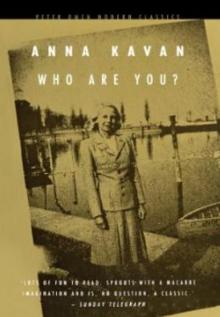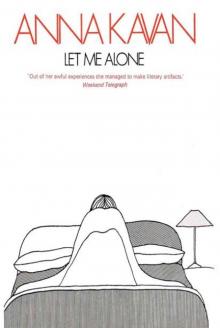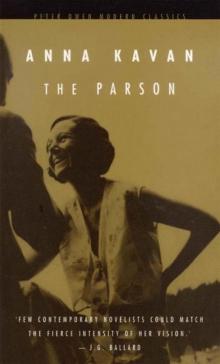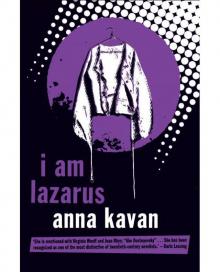Ice Read online
PENGUIN CLASSICS
ICE
ANNA KAVAN (1901–1968) was born Helen Woods. She began her career writing under her married name Helen Ferguson, publishing six novels. It was only after she had a nervous breakdown that she became Anna Kavan, the protagonist of her 1930 novel Let Me Alone, with an outwardly different persona and a new literary style. Much of her life remains an enigma, but her talent was nonetheless remarkable, and her works have been compared to those of Doris Lessing, Virginia Woolf, and Franz Kafka. Kavan suffered periodic bouts of mental illness and long-term drug addiction—she became addicted to heroin in the 1920s and continued to use it throughout her life—and these facets of her life feature prominently in her work. Her widely admired works include Asylum Piece, I Am Lazarus, and Julia and the Bazooka (published posthumously). She died in 1968 of heart failure, soon after the publication of her most celebrated work, Ice.
JONATHAN LETHEM is the New York Times bestselling author of nine novels, including Dissident Gardens, Chronic City, The Fortress of Solitude, and Motherless Brooklyn, and of the essay collection The Ecstasy of Influence, which was a National Book Critics Circle Award finalist. A recipient of the MacArthur Fellowship and winner of the National Book Critics Circle Award for Fiction, Lethem’s work has appeared in The New Yorker, Harper’s Magazine, Rolling Stone, Esquire, and The New York Times, among other publications.
KATE ZAMBRENO is the author of the novels Green Girl and O Fallen Angel, as well as two works of experimental nonfiction, Heroines and Book of Mutter. She is at work on a series of books about time, memory, and the persistence of art. She teaches in the writing programs at Sarah Lawrence College and Columbia University.
PENGUIN BOOKS
An imprint of Penguin Random House LLC
375 Hudson Street
New York, New York 10014
penguin.com
First published in Great Britain by Peter Owen Ltd 1967
First published in the United States of America by Doubleday & Company, Inc. 1970
This edition with a foreword by Jonathan Lethem and an afterword by Kate Zambreno published in Penguin Books 2017
Copyright © 1967 by Anna Kavan
Foreword copyright © 2017 by Jonathan Lethem
Afterword copyright © 2006 by Kate Zambreno
Penguin supports copyright. Copyright fuels creativity, encourages diverse voices, promotes free speech, and creates a vibrant culture. Thank you for buying an authorized edition of this book and for complying with copyright laws by not reproducing, scanning, or distributing any part of it in any form without permission. You are supporting writers and allowing Penguin to continue to publish books for every reader.
Published by arrangement with Peter Owen Publishers, London.
The afterword by Kate Zambreno first appeared as “Anna Kavan” in Context, issue 18.
LIBRARY OF CONGRESS CATALOGING-IN-PUBLICATION DATA
Names: Kavan, Anna, 1901–1968, author.
Title: Ice / Anna Kavan ; foreword by Jonathan Lethem ; afterword by Kate Zambreno.
Description: 50th anniversary edition. | New York : Penguin Books, 2017.
Identifiers: LCCN 2017018717 (print) | LCCN 2017018810 (ebook) | ISBN 9780525503774 (ebook) | ISBN 9780143131991 (paperback)
Subjects: | BISAC: FICTION / Literary. | GSAFD: Science fiction.
Classification: LCC PR6009.D63 (ebook) | LCC PR6009.D63 I24 2017 (print) | DDC 823/.912—dc23
LC record available at https://lccn.loc.gov/2017018717
Cover illustration: Hsiao-Ron Cheng
Version_1
Contents
About the Authors
Title Page
Copyright
Foreword by JONATHAN LETHEM
ICE
Afterword by KATE ZAMBRENO
Foreword
Gazing at Ice
Anna Kavan’s Ice is a book like the moon is the moon. There’s only one. It’s cold and white, and it stares back, both defiant and impassive, static and frantically on the move, marked by phases, out of reach. It may even seem to be following you. It is a book that hides, and glints, like “the girl” who is at the center of its stark, fable-like tableau of catastrophe, pursuit, and repetition-compulsion. The tale might seem simple: a desperate love triangle played out in a world jarred into eco-catastrophe by political and scientific crimes. The narrator, whose resolute search for the girl might appear at first benign or even heroic, nonetheless slowly converges with the personality and motives of the sadistic, controlling “warden,” who is the book’s antagonist and the narrator’s double. Though Ice is always lucid and direct, nothing in it is simple, and it gathers to itself the properties of both a labyrinth and a mirror.
Like the girl, and like the book’s author, Ice attracts fascination and would-be sponsors. Published in 1967, the book has been introduced by Brian Aldiss, Christopher Priest, Anaïs Nin (whose introduction for the first edition was rejected by Kavan), and now myself. Ice has also generated admiring comments by Doris Lessing and L. P. Hartley, and critical appraisals by L. Timmel Duchamp, Elizabeth Young, and Kate Zambreno—and Kavan has already been the subject of two biographies. Perhaps, given the comparison—and since the brittle, damaged, entrancing “girl” hardly thrives in the enclosures devised for her by the narrator and the warden—you should probably suspect all our motives and go past these words, to the pages of Ice itself.
I first located Ice in a used bookstore, in its first American edition, published by Doubleday after Kavan’s death and introduced by Aldiss, who called it science fiction. This was during the time in my reading life when I was trying so hard to find something more like Philip K. Dick and J. G. Ballard and a handful of other things (including certain of Aldiss’s own books, like Report on Probability A). But Kavan’s Ice wasn’t more of anything. I doubt it helps for it to be categorized as science fiction, or to be categorized at all. Even given Anna Kavan’s remarkable life story, and amid her shelf of coolly anguished fiction, Ice stands alone.
Kavan wasn’t her real name—or perhaps I should say it wasn’t her first name. Born Helen Woods to an upper-class British family, then twice miserably married to older alcoholics, she published several novels under her first married name, Helen Ferguson. From these books, which were precise and despairing, if conventional by the standard of her later writing, she seized up for her self-invention the name of her own autobiographical character: Anna Kavan. The details of her long traipse through wartime exile, multiple suicide attempts, psychiatric incarcerations, and decades of heroin addiction could fill books; Kavan filled sixteen novels with them, though her preference was to sublimate autobiography into pensive, dislocated, and somewhat numbed tableaux.
The frozen disaster overtaking the planet in Ice evokes that cold-war, bomb-dreading, postwar twentieth century we still, in many ways, live inside; it echoes images as popular as episodes of Rod Serling’s Twilight Zone or Kurt Vonnegut’s Cat’s Cradle. The presentation is scattered with scenes of war, civil unrest, and collective societal dysfunction, both vivid and persuasive. During World War II Kavan journeyed by steamer slowly from New Zealand to various ports, including New York, and at last returning to England. A realistic novelist might have made some epic like Olivia Manning’s Balkan and Levant trilogies from this, but Kavan wasn’t a maker of epics and was accompanied not by a colorful husband but by her own violent solitude. A crushed-down and imagistic epic of flight may lurk in the interstices of Ice, in fact. Yet as in Kafka, Poe, Kōbō Abe, and Ishiguro’s The Unconsoled, the essential disturbance resides in an inextricable interplay between inner and outer worlds.
Kavan’s commitment to subjectivity was absolute, but in this, her greatest
novel, she manages it by disassociation. If “the girl” is in some way a figure of Kavan’s own vulnerability, she’s also a cypher, barely glimpsed, and as exasperating as she is pitiable. It’s been suggested that the “ice” in Ice translates to a junkie’s relationship to her drug, yet the book is hardly reducible to this or any other form of allegory. Heroin may be integral to the book, hiding everywhere in plain sight and yet also beside the point. The drama of damage and endurance in Ice plays out in an arena of dire necessity and, somehow simultaneously, anomic, dispassionate curiosity.
What makes this not only possible, but also riveting and unforgettable, is Kavan’s meticulous, compacted style. The book has the velocity of a thriller yet the causal slippages associated with high modernist writing like Beckett’s or Kafka’s. The whole presentation is dreamlike, yet even that surface is riven by dream sequences, and by anomalous ruptures in point-of-view and narrative momentum. At times this gives the reader the sensation that Ice works like a collage or mashup; perhaps William Burroughs has been given a go at it with his scissors and paste pot. By the end, however, one feels at the mercy of an absolutely precise and merciless prose machine, one simply uninterested in producing the illusion of cause and effect. In the place of what’s called “plot,” Kavan offers up a recursive system, an index of reaction points as unsettling and neatly tailored as a sheaf of Rorschach blots. The book’s nearest cousins, it seems to me, are Crash, Ballard’s most narratively discontinuous and imagistic book, or cinematic contemporaries like Godard’s Alphaville (released two years before Ice but not an influence, probably, on a book in the making many years earlier) and Alain Resnais’s Last Year at Marienbad (from 1961, and Kavan was an admirer of its screenwriter, the French novelist Alain Robbe-Grillet). It’ll stick around, as those have, and it may even cut deeper.
Like the moon, but with sharp edges.
JONATHAN LETHEM
ONE
I was lost, it was already dusk, I had been driving for hours and was practically out of petrol. The idea of being stranded on these lonely hills in the dark appalled me, so I was glad to see a signpost, and coast down to a garage. When I opened a window to speak to the attendant, the air outside was so cold that I turned up my collar. While he was filling the tank he commented on the weather. “Never known such cold in this month. Forecast says we’re in for a real bad freeze-up.” Most of my life was spent abroad, soldiering, or exploring remote areas: but although I had just come from the tropics and freeze-ups meant little to me, I was struck by the ominous sound of his words. Anxious to get on, I asked the way to the village I was making for. “You’ll never find it in the dark, it’s right off the beaten track. And those hill roads are dangerous when they’re iced up.” He seemed to imply that only a fool would drive on under present conditions, which rather annoyed me. So, cutting short his involved directions, I paid him and drove away, ignoring his last warning shout: “Look out for that ice!”
It had got quite dark by now, and I was soon more hopelessly lost than ever. I knew I should have listened to the fellow, but at the same time wished I had not spoken to him at all. For some unknown reason, his remarks had made me uneasy; they seemed a bad omen for the whole expedition, and I began to regret having embarked on it.
I had been doubtful about the trip all along. I had arrived only the previous day, and should have been attending to things in town instead of visiting friends in the country. I myself did not understand my compulsion to see this girl, who had been in my thoughts all the time I was away, although she was not the reason for my return. I had come back to investigate rumors of a mysterious impending emergency in this part of the world. But as soon as I got here she became an obsession, I could think only of her, felt I must see her immediately, nothing else mattered. Of course I knew it was utterly irrational. And so was my present uneasiness: no harm was likely to come to me in my own country; and yet I was becoming more and more anxious as I drove on.
Reality had always been something of an unknown quantity to me. At times this could be disturbing. Now, for instance, I had visited the girl and her husband before, and kept a vivid recollection of the peaceful, prosperous-looking countryside round their home. But this memory was rapidly fading, losing its reality, becoming increasingly unconvincing and indistinct, as I passed no one on the road, never came to a village, saw no lights anywhere. The sky was black, blacker untended hedges towering against it; and when the headlights occasionally showed roadside buildings, these too were always black, apparently uninhabited and more or less in ruins. It was just as if the entire district had been laid waste during my absence.
I began to wonder if I would ever find her in the general disorder. It did not look as if any organized life could have been going on here since whatever disaster had obliterated the villages and wrecked the farms. As far as I could see, no attempt had been made to restore normality. No rebuilding or work on the land had been done, no animals were in the fields. The road badly needed repairs, the ditches were choked with weeds under the neglected hedges, the whole region appeared to have been left derelict and deserted.
A handful of small white stones hit the windscreen, making me jump. It was so long since I had experienced winter in the north that I failed to recognize the phenomenon. The hail soon turned to snow, diminishing visibility and making driving more difficult. It was bitterly cold, and I became aware of a connection between this fact and my increasing uneasiness. The garage man had said he had never known it so cold at this time, and my own impression was that it was far too early in the season for ice and snow. Suddenly my anxiety was so acute that I wanted to turn and drive back to town; but the road was too narrow, I was forced to follow its interminable windings up and down hill in the lifeless dark. The surface got worse, it got steeper and more slippery all the time. The unaccustomed cold made my head ache as I stared out, straining my eyes in the effort of trying to avoid icy patches, where the car skidded out of control. When the headlights fled over roadside ruins from time to time, the brief glimpse always surprised me, and vanished before I was sure I had really seen it.
An unearthly whiteness began to bloom on the hedges. I passed a gap and glanced through. For a moment, my lights picked out like searchlights the girl’s naked body, slight as a child’s, ivory white against the dead white of the snow, her hair bright as spun glass. She did not look in my direction. Motionless, she kept her eyes fixed on the walls moving slowly toward her, a glassy, glittering circle of solid ice, of which she was the center. Dazzling flashes came from the ice-cliffs far over her head; below, the outermost fringes of ice had already reached her, immobilized her, set hard as concrete over her feet and ankles. I watched the ice climb higher, covering knees and thighs, saw her mouth open, a black hole in the white face, heard her thin, agonized scream. I felt no pity for her. On the contrary, I derived an indescribable pleasure from seeing her suffer. I disapproved of my own callousness, but there it was. Various factors had combined to produce it, although they were not extenuating circumstances.
I had been infatuated with her at one time, had intended to marry her. Ironically, my aim then had been to shield her from the callousness of the world, which her timidity and fragility seemed to invite. She was over-sensitive, highly strung, afraid of people and life; her personality had been damaged by a sadistic mother who kept her in a permanent state of frightened subjection. The first thing I had to do was to win her trust, so I was always gentle with her, careful to restrain my feelings. She was so thin that, when we danced, I was afraid of hurting her if I held her tightly. Her prominent bones seemed brittle, the protruding wrist-bones had a particular fascination for me. Her hair was astonishing, silver-white, an albino’s, sparkling like moonlight, like moonlit venetian glass. I treated her like a glass girl; at times she hardly seemed real. By degrees she lost her fear of me, showed a childish affection, but remained shy and elusive. I thought I had proved to her that I could be trusted, and was content to wait. She seemed on th
e point of accepting me, although immaturity made it hard to assess the sincerity of her feelings. Her affection perhaps was not altogether pretense, although she deserted me suddenly for the man to whom she was now married.
This was past history. But the consequences of the traumatic experience were still evident in the insomnia and headaches from which I suffered. The drugs prescribed for me produced horrible dreams, in which she always appeared as a helpless victim, her fragile body broken and bruised. These dreams were not confined to sleep only, and a deplorable side effect was the way I had come to enjoy them.
Visibility had improved, the night was no less dark, but the snow had stopped. I could see the remains of a fort on the top of a steep hill. Nothing much was left of it but the tower, it had been gutted, empty window-holes showed like black open mouths. The place seemed vaguely familiar, a distortion of something I half remembered. I seemed to recognize it, thought I had seen it before, but could not be certain, as I had only been here in the summer, when everything looked quite different.
At that time, when I accepted the man’s invitation, I suspected him of an ulterior motive in asking me. He was a painter, not serious, a dilettante; one of those people who always have plenty of money without appearing to do any work. Possibly he had a private income: but I suspected him of being something other than what he seemed. The warmth of my reception surprised me, he could not have been more friendly. All the same, I was on my guard.
The girl hardly spoke, stood beside him, glancing sideways at me with big eyes through her long lashes. Her presence affected me strongly, although I scarcely knew in what way. I found it difficult to talk to the two of them. The house was in the middle of a beech wood, so closely surrounded by many tall trees that we seemed to be actually in the treetops, waves of dense green foliage breaking outside every window. I thought of an almost extinct race of large singing lemurs known as the Indris, living in the forest trees of a remote tropical island. The gentle affectionate ways and strange melodious voices of these near-legendary creatures had made a great impression on me, and I began speaking about them, forgetting myself in the fascination of the subject. He appeared interested. She said nothing, and presently left us to see about lunch. The conversation at once became easier when she had gone.

 Machines in the Head
Machines in the Head Ice
Ice Who Are You?
Who Are You? Let Me Alone
Let Me Alone Sleep Has His House
Sleep Has His House The Parson (Peter Owen Modern Classic)
The Parson (Peter Owen Modern Classic) Guilty: The Lost Classic Novel
Guilty: The Lost Classic Novel I Am Lazarus (Peter Owen Modern Classic)
I Am Lazarus (Peter Owen Modern Classic)